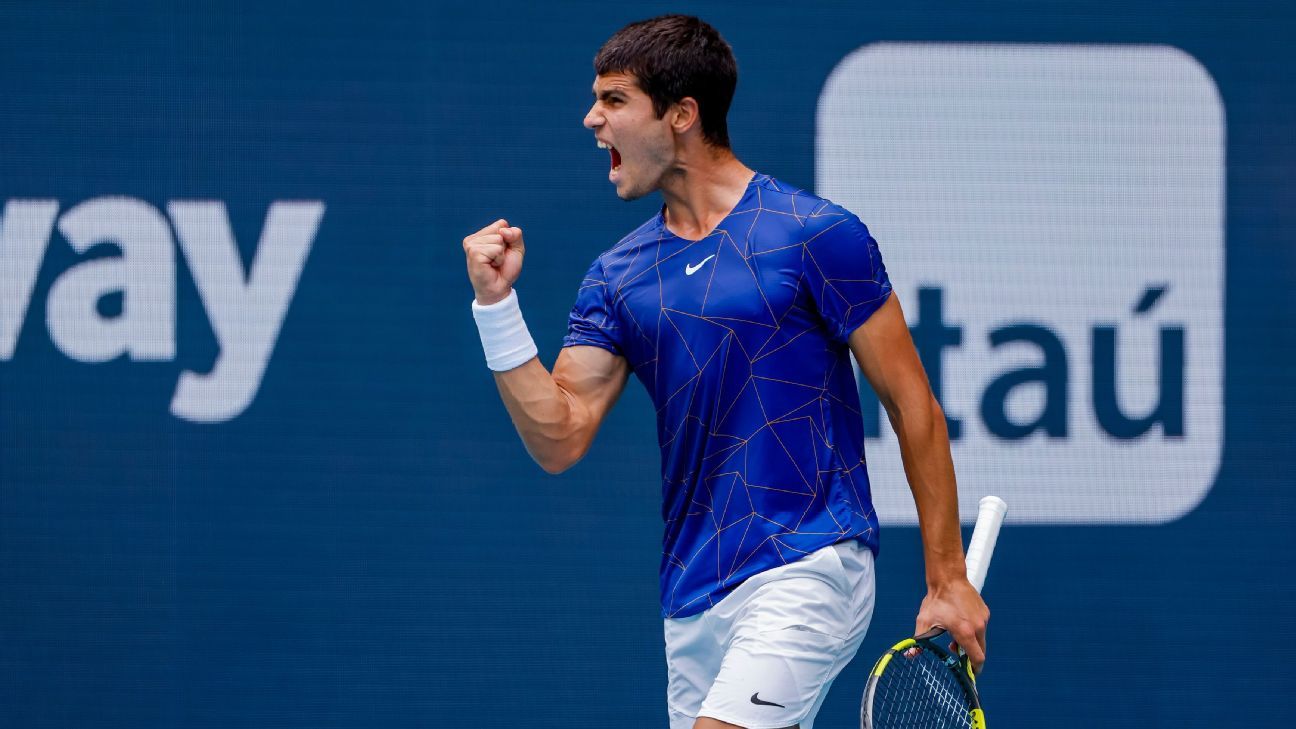Products You May Like
MIAMI GARDENS, Fla. — Spanish fans brought plenty of their nation’s flags to Hard Rock Stadium on Sunday, thrusting them into the air whenever things were going well for Carlos Alcaraz.
He kept them busy, all the way to the end.
Spain finally has a Miami Open men’s champion: an 18-year-old who wasn’t even in the top 100 of the world rankings at this time a year ago and now heads into the clay-court season arguably playing as well as anyone. Alcaraz, the No. 14 seed, shook off a slow start to beat sixth-seeded Casper Ruud of Norway 7-5, 6-4 in Sunday’s final.
“I love Miami,” Alcaraz said.
The melting pot city of Miami — with its massive Spanish-speaking community — loved him back, and Alcaraz said that made a big difference throughout his two-week stay.
“I felt like I was home from the first minute I began playing,” Alcaraz said.
He became the youngest champion in Miami Open history — Novak Djokovic was 19 when he won the tournament, then the NASDAQ-100 Open, for the first time — and picked up $1,231,245 for the victory, nearly doubling his career earnings with one check.
The shot-making ability from the Spanish teen was on full display: daring drop shots in tense situations, deft touch at the net when needed, raw power from the baseline when warranted. Alcaraz often would look to his team in the stands and give a joyous yell or a knowing fist-pump, clearly feeling more comfortable as the afternoon went along.
Among those there with him: his coach, Juan Carlos Ferrero. He had been away while mourning the death of his father, but made it back to Miami in time for the final. And when the match was over, Alcaraz hopped into the stands to give Ferrero his first hug as a Miami champion, as his coach wiped away tears.
“It’s pretty amazing to share this with you,” Alcaraz told Ferrero.
There had been four other Spanish men to make the final at what now is called the Miami Open — the tournament has changed names a few times over the years — over the last quarter-century. Sergi Bruguera was the first, in 1997. Carlos Moya was next, in 2003. David Ferrer got there in 2013 and the best player of them all, Rafael Nadal, made it to the Miami final in 2005, 2008, 2011, 2014 and 2017.
They all lost. Every time.
Alcaraz ended the drought and did so with authority.
He ripped a crosscourt forehand for a double-break lead of 3-0 in the second set. Ruud broke back for 3-1, and had a chance at setting up another breaker late in the set.
With Alcaraz hitting a second serve at 4-3, 30-30, Ruud guessed the incoming ball’s path correctly and ran around his backhand to try what would have been a down-the-line winner. He put it just wide, and a point later Alcaraz was up 5-3. Before long, it was over.
“You’re such a good player already,” Ruud told Alcaraz during the trophy ceremony. “You’re so young and if you continue like this you will stand there many more times. I’m sure of it.”
Alcaraz lost one set in six matches in Miami, improved to 18-2 overall this year and became the third-youngest winner of any ATP Masters 1000 series event — which goes back to 1990. The only younger winners: Michael Chang and Nadal.
Impressive company.
“For me, he’s one of the top four people that you have to talk about at every major now, along with Djokovic, Nadal and (Daniil) Medvedev,” raved tennis great Martina Navratilova on Tennis Channel after the match. “He’s the fourth one, for me.”
Rankings-wise, both players leave Miami better than ever. Ruud is expected to climb one spot to a career-best No. 7 in the world when the computer numbers are updated Monday; Alcaraz will be a career-best No. 11.
For Ruud, the rise has been steady. He was No. 26 in the world after Miami last year.
For Alcaraz, the rise has been meteoric. He was ranked No. 133 at this time a year ago.
But he made big jumps — getting to the third round of last year’s French Open as a qualifier pushed him into the top 75, making the US Open quarterfinals got him into the top 50, winning a tournament in Rio de Janeiro in February got him into the top 20, and he leaves Miami flirting with the top 10.
“You’re a great champion … and I hope you return for many years to the Miami Open,” tournament director James Blake told Alcaraz after the match, apologizing for the quality of his Spanish.
The scoreboard needed no translation.
In any language, Alcaraz was the best in Miami.
